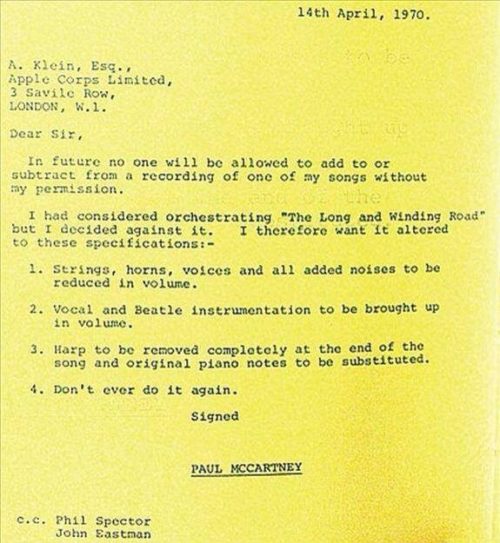‘The Long and Winding Road’, featuring on the band’s record Let It Be, was recorded before their ultimate record Abbey Road, this song had been finished after that record had come out and in less than pleasing circumstances. As John Lennon put it in 1980 when speaking with David Sheff, “He had a little spurt just before we split. I think the shock of Yoko Ono and what was happening gave him a creative spurt including ‘Let It Be’ and ‘Long And Winding Road’, ’cause that was the last gasp from him.”
Paul McCartney composed the song as a simple piano ballad. Paul said of the track in “Many Years From Now”: “I was a bit flipped out and tripped out at that time. It’s a sad song because it’s all about the unattainable; the door you never quite reach. This is the road that you never get to the end of.”
The song also followed a similar pattern of creation for McCartney and was somewhat inspired by the talented Ray Charles, for whom, Macca held a great deal of respect. The singer told Barry Miles once more: “It doesn’t sound like him at all, because it’s me singing and I don’t sound anything like Ray, but sometimes you get a person in your mind, just for an attitude, just for a place to be, so that your mind is somewhere rather than nowhere, and you place it by thinking, Oh, I love that Ray Charles, and think, Well, what might he do then?”
Initially recorded for the Get Back sessions in January 1969, the song was performed on a few occasions, but it was their session from the 26th January that was chosen by Glyn Johns to appear as part of the Get Back LP; the record which would form the basis of Let It Be, released in 1970.
Phil Spector was put in charge of releasing Let It Be, and that meant overdubbing plenty of songs so he could achieve his famed ‘Wall of Sound’ production. “On ‘The Long And Winding Road’ he wanted to overdub orchestra and choir but there weren’t the available tracks on the tape,” remember engineer Brian Gibson when speaking to Mark Lewisohn for his book on the band. “So he wiped one of Paul McCartney’s two vocal tracks in order to put the orchestra on.”
When Apple Corps, at this time being run by Allen Klein, sent McCartney the pre-release acetate of the song, Macca hit the roof. He was furious with what he heard and saw as an injustice to his artistry. He told the Evening Standard in 1970: “The album was finished a year ago, but a few months ago American record producer Phil Spector was called in by John Lennon to tidy up some of the tracks. But a few weeks ago, I was sent a re-mixed version of my song ‘The Long And Winding Road’, with harps, horns, an orchestra and women’s choir added.
“No one had asked me what I thought. I couldn’t believe it,” continued Paul. “I would never have female voices on a Beatles record. The record came with a note from Allen Klein saying he thought the changes were necessary. I don’t blame Phil Spector for doing it but it just goes to show that it’s no good me sitting here thinking I’m in control because obviously, I’m not. Anyway, I’ve sent Klein a letter asking for some of the things to be altered, but I haven’t received an answer yet.”
Paul’s letter was perfectly barbed, he wrote: “In future no one will be allowed to add to or subtract from a recording of one of my songs without my permission.
I had considered orchestrating ‘The Long And Winding Road’ but I had decided against it. I, therefore, want it altered to these specifications,” As well as offering some general advice on how he would prefer the song to sound he ended with a simple request: “Don’t ever do it again.”

The Let It Be album was released with Spector’s ‘The Long and Winding Road’ cut still present, something George Martin took umbrage with: “That made me angry – and it made Paul even angrier, because neither he nor I knew about it till it had been done. It happened behind our backs because it was done when Allen Klein was running John. He’d organised Phil Spector and I think George and Ringo had gone along with it. They’d actually made an arrangement with EMI and said, ‘This is going to be our record.’”
Things got stranger after they confirmed that Martin’s name wouldn’t appear on the album as it had done on all the other records because he “‘didn’t produce the final thing’ I said, ‘I produced the original and what you should do is have a credit saying: “Produced by George Martin, over-produced by Phil Spector”.’ They didn’t think that was a good idea.”
The song, as Paul intended it, did eventually see the light of day as part of Anthology 3.

